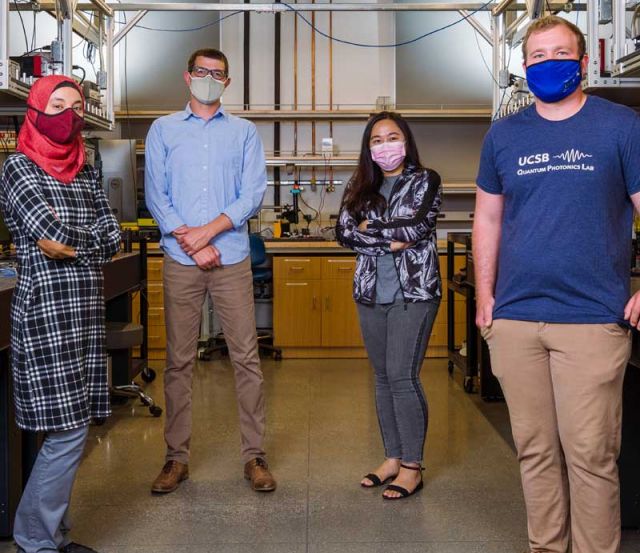
Faculty Mentorship
Galan Moody | Assistant Professor
From The ECE Current Newsletter (Fall 2021)
"I would encourage undergraduates to look for a mentor as early as possible! Mentors help students learn about their career options, interests and goals, undergraduate research and internship opportunities, and ways to prepare for the next phase of their career."
What does mentoring mean to you and why is it important in your profession?
The most important aspect of my profession is to serve as a role model and mentor for students. Academia is driven by the students, and my role is to help guide them through this phase of their life and career. I definitely benefited from the advice of several great mentors, and I still speak with them regularly for guidance. I strive to do the same for my students!
As a student did you have faculty that you looked up to?
I took two courses from Eric Cornell and Carl Wieman—Physics Nobel Laureates who created the first Bose-Einstein condensate in 1995. They had an uncanny ability to break down difficult topics into easy-to-understand concepts and they helped students develop similar critical thinking and reasoning skills. I really try to emulate this type of teaching style in my courses too. My PhD advisor, Steve Cundiff, had a similar advising style—explaining difficult research topics in ways that were easier to understand. He was also very supportive of undergraduate and graduate research, both in the lab and through professional development.
Do you think it is helpful for undergraduates to find a mentor?
Absolutely, and I would encourage undergraduates to look for a mentor as early as possible! Mentors help students learn about their career options, interests and goals, undergraduate research and internship opportunities, and ways to prepare for the next phase of their career. Different methods for finding a mentor include emailing faculty or stopping by their office, taking a course by faculty whose research interests you, speaking with the students in their research group, or attending seminars to learn more about the different research groups in the department and on campus.
How do you measure your success as a teacher?
For me, success is being able to engage with every student in my class on some level, so everyone feels welcome and that they can contribute, even if the course topic isn’t in their research field or wasn’t something they were originally interested in. My hope is that each student leaves my class learning or refining critical thinking skills, having developed a new conceptual understanding of a challenging topic, or they feel inspired to pursue a new research direction or career path.
Do most students come to you with a clearly defined path and goal? If not, how do you help them get there?
Some do and some don’t! When I was an undergraduate student, I had no idea what I wanted to work on and what career path I was interested in. My undergraduate mentor (and eventual PhD advisor) allowed me to work on several projects over the course of a few years, and more importantly, I attended and presented at several research conferences. These are two great ways for students to get exposed to leading academic research and industry developments.
What aspects of an academic career do you find most rewarding?
In the research lab, it’s amazing to see all the hard work that my students put in and how it pays off. It could be a new device that they designed and fabricated, or experiments and measurements that led to exciting or unanticipated results. Seeing them take ownership of their research and their future, and me being able to support them through mentorship and professional development, is by far the most rewarding aspect. The same goes for teaching—I do my best to create an engaging academic environment, and seeing students respond to that through their interest and hard work is really inspiring.
What do you hope your students take away from their time in your lab?
If nothing else, I hope my students become the best scientific citizens that they can be. This means learning how to carry out impactful research projects, hold themselves to high ethical and professional standards, and engaging with their community to inspire the next generation of learners.
What is the greatest thing a student ever taught you?
Many students continually teach me that I can always improve as a researcher, educator, and mentor. Students ask insightful and thought provoking questions that always keep me on my toes and remind me that I can always improve professionally and personally. Keep asking great and challenging questions!
Do you have any advice for ECE students?
Engage with faculty as soon as you can to help maximize your opportunities going forward. Also, developing habits to maintain a healthy school-life balance is really important, and meeting with a faculty mentor often for guidance is key for this.
The ECE Current (Fall 2021) "Faculty Mentorship: Professor Galan Moody" (page 5)